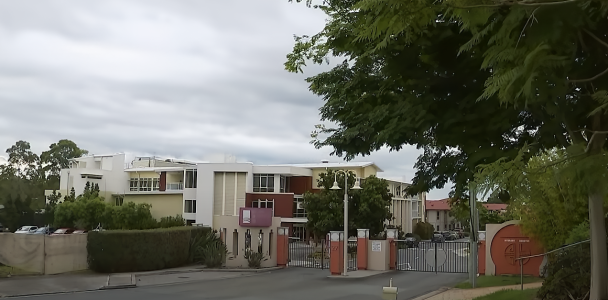Non-compliant care facilities could deceive you with five-star ratings—learn the disturbing truth!
By
- Replies 23
In the quest for quality aged care, families across Australia rely on government ratings to guide their decisions.
However, a recent investigation revealed a troubling discrepancy that could mislead consumers: aged care facilities that fail to meet government standards are still awarded high star ratings.
This revelation has sparked concern and debate about the integrity of the star rating system and the quality of care provided to our elderly loved ones.
The star rating system, launched in 2022 in response to the Aged Care Royal Commission's findings of widespread elder abuse and neglect, was intended to provide transparency and help Australians make informed choices about aged care facilities.
Aged Care Minister Anika Wells has touted the system as a means to foster open dialogue and improve the sector, citing a 27 per cent increase in 4-5 star rated nursing homes since December 2022.
However, the system's credibility is now in question.
Research into the government's star rating website has uncovered that dozens of non-compliant homes have received 3, 4, and even 5-star ratings, contrary to the government's guidelines that non-compliant facilities should not be rated above two stars.
This discrepancy has been attributed to a loophole: a facility's star rating is only affected if regulatory action has also been taken against it.
Rodney Jilek, a former federal government compliance officer with 30 years of experience in the sector, has criticised the system as 'deceptive' and potentially a 'political tool' to exaggerate the quality of aged care services.
‘The reality is that all of the other data sources are pointing out that aged care is actually getting worse.’ he said.
His research found 300 homes rated between 3 and 5 stars despite being non-compliant with government standards.
‘[The star rating system] is giving a deceptive picture of what is happening in aged care,’ Jilek continued.
‘You would have to go back and have a look at the intent of the system, whether it was truly intended to be a transparent avenue for people to choose homes, or whether it was intended to be a political tool to over-exaggerate the quality of care.’
One example is the Newcastle-based Wallsend aged care home, which received a 5-star rating while a government audit found it non-compliant with all eight standards.
Families like Rodney Reed's, who chose the Charles Brownlow nursing home for his wife Kath based on its high star rating, have suffered tragic consequences.
Despite the facility's 4-5 star rating and a glowing audit, Kath's health deteriorated rapidly under their care, leading to her death from sepsis, dehydration, and renal failure.
‘The budget was not an issue,’ Mr Reed stated.
‘We wanted Kath to be safe, secure and comfortable.’
‘When you look at the building, you think, this is a 6-star hotel. Their brochures and information books were glowing. But I guess it was the physical things that I got lured into.’.
Mr Reed's initial concern arose when he discovered that the gym and pool advertised in the brochure were restricted to the nearby retirement village and unavailable to nursing home residents.
However, this issue was overshadowed by his wife's deteriorating health in August 2023.
Their daughter, Steph Foley, recalls how her mother suddenly seemed lost and confused.
‘I remember I tried to take her for a walk, and she put a magazine on her head,’ she said.
‘I said, “Could she have had a stroke”?’
In the following month, Kath lost 7 kilograms.
When Ms Foley and her father sought information and answers from the nursing home, their requests were ignored.
Concerned, Mr Reed hired an independent geriatrician to assess his wife.
The geriatrician's report revealed that Kath was in a near-terminal state after nine days with no food and minimal fluids.
Immediate hospitalisation was advised to improve her chances of survival.
Records obtained through a Freedom of Information request revealed that Kath suffered from sepsis, dehydration, and renal failure.
After her condition stabilised, she was transferred back to the nursing home, where her family reported that her situation deteriorated further.
‘There was a time when I thought she was in a lot of pain, and I went out to ask the coordinator to help, and her reply was, “How long will it take?” I was crying,’ Ms Foley said.
‘Two days later, she died, so we felt a real sense of betrayal that we were so ignorant in terms of her real condition,’ Mr Reed said.
Mr Reed and his daughter filed a complaint with the Aged Care Quality and Safety Commission, which led to an investigation revealing that Kath Reed was malnourished, in unmanaged pain, and incorrectly medicated.
Despite these findings and a phone call, a clinical quality manager expressed shock at the care deficiencies and recommended increased compliance oversight.
Charles Brownlow Nursing Home's star rating was upgraded from 4 to 5 stars three months later.
Mr Reed expressed confusion over this rating increase.
Charles Brownlow acknowledged that some aspects of Kath Reed's care did not meet their standards but stated that they implemented all of the Commission's recommendations.
Two senior managers involved have since left the facility.
Aged Care Commissioner Janet Anderson explained that formal regulatory actions are not pursued if a nursing home quickly addresses non-compliance risks.
She also defended the star rating system as an accurate reflection of care quality.
The star rating system's shortcomings are further compounded by another loophole: when a facility changes ownership, its negative history is wiped clean, and it is left without a star rating for 12 months.
‘The consequence of that is that the general public has no idea of the current performance of the service, and they also don't know what the past performance of the service is,’ Mr Jilek said.
‘It's a clean slate.’
This was the case with Opal Healthcare's acquisition of the troubled Jeta Gardens, now renamed Bethania Parklands, which had a history of non-compliance and a deadly COVID outbreak.
The Aged Care Quality and Safety Commission and Aged Care Commissioner Janet Anderson maintain that the overall star rating is accurate and reliable and that the system is working to address compliance issues.
However, the experiences of families like the Reeds and Shaz Campbell, whose mother, Diana Bourn, also suffered neglect at Jeta Gardens, tell a different story.
When Jeta Gardens reopened, Ms Campbell discovered letters her mother had written to the family, one of which pleaded, ‘It's like a madhouse in here. Please help me. Lots of love, Mum.’
A few weeks later, Ms Campbell was informed by a nurse that her mother was being rushed to the hospital.
At the hospital, she found her mother unconscious and in poor condition, so unkempt that staff initially mistook her for homeless.
The severe odour and filth struck Ms Campbell.
Upon asking about her mother's condition, a nurse at Jeta Gardens mistakenly forwarded an email revealing internal concerns about potential sanctions for neglect, as Ms Bourn had not received the antibiotics she needed for a UTI.
The attachments indicated that Mrs Bourn had requested a hospital transfer while in a lethargic state.
Diagnosed with sepsis, Mrs Bourn died in the hospital 12 days after the initial UTI. Ms Campbell later found the unopened antibiotics in her mother’s room and received a bill from Jeta Gardens for them.
An investigation by the Aged Care Quality and Safety Commission found that Mrs Bourn did not receive appropriate care.
In response, Jeta Gardens pledged to revise its care protocols and retrain staff.
The facility, now known as Bethania Parklands, is under new ownership and currently does not have a star rating.
Ms Campbell advocates for publicising her mother’s case, stating, ‘No other family should go through this heartache. These are human beings, family members who deserve proper care.’
Opal Healthcare, the current operator, declined to comment on the past incidents, noting they occurred under previous management.
They stated that they had introduced a new management team and made significant improvements since taking over.
An external consultancy is currently reviewing the star rating system.
Credit: ABC News In-depth / YouTube

Have you or someone you know had an experience with the aged care star rating system? Feel free to hare your stories and experiences with us in the comments below.
However, a recent investigation revealed a troubling discrepancy that could mislead consumers: aged care facilities that fail to meet government standards are still awarded high star ratings.
This revelation has sparked concern and debate about the integrity of the star rating system and the quality of care provided to our elderly loved ones.
The star rating system, launched in 2022 in response to the Aged Care Royal Commission's findings of widespread elder abuse and neglect, was intended to provide transparency and help Australians make informed choices about aged care facilities.
Aged Care Minister Anika Wells has touted the system as a means to foster open dialogue and improve the sector, citing a 27 per cent increase in 4-5 star rated nursing homes since December 2022.
However, the system's credibility is now in question.
Research into the government's star rating website has uncovered that dozens of non-compliant homes have received 3, 4, and even 5-star ratings, contrary to the government's guidelines that non-compliant facilities should not be rated above two stars.
This discrepancy has been attributed to a loophole: a facility's star rating is only affected if regulatory action has also been taken against it.
Rodney Jilek, a former federal government compliance officer with 30 years of experience in the sector, has criticised the system as 'deceptive' and potentially a 'political tool' to exaggerate the quality of aged care services.
‘The reality is that all of the other data sources are pointing out that aged care is actually getting worse.’ he said.
His research found 300 homes rated between 3 and 5 stars despite being non-compliant with government standards.
‘[The star rating system] is giving a deceptive picture of what is happening in aged care,’ Jilek continued.
‘You would have to go back and have a look at the intent of the system, whether it was truly intended to be a transparent avenue for people to choose homes, or whether it was intended to be a political tool to over-exaggerate the quality of care.’
One example is the Newcastle-based Wallsend aged care home, which received a 5-star rating while a government audit found it non-compliant with all eight standards.
Families like Rodney Reed's, who chose the Charles Brownlow nursing home for his wife Kath based on its high star rating, have suffered tragic consequences.
Despite the facility's 4-5 star rating and a glowing audit, Kath's health deteriorated rapidly under their care, leading to her death from sepsis, dehydration, and renal failure.
‘The budget was not an issue,’ Mr Reed stated.
‘We wanted Kath to be safe, secure and comfortable.’
‘When you look at the building, you think, this is a 6-star hotel. Their brochures and information books were glowing. But I guess it was the physical things that I got lured into.’.
Mr Reed's initial concern arose when he discovered that the gym and pool advertised in the brochure were restricted to the nearby retirement village and unavailable to nursing home residents.
However, this issue was overshadowed by his wife's deteriorating health in August 2023.
Their daughter, Steph Foley, recalls how her mother suddenly seemed lost and confused.
‘I remember I tried to take her for a walk, and she put a magazine on her head,’ she said.
‘I said, “Could she have had a stroke”?’
In the following month, Kath lost 7 kilograms.
When Ms Foley and her father sought information and answers from the nursing home, their requests were ignored.
Concerned, Mr Reed hired an independent geriatrician to assess his wife.
The geriatrician's report revealed that Kath was in a near-terminal state after nine days with no food and minimal fluids.
Immediate hospitalisation was advised to improve her chances of survival.
Records obtained through a Freedom of Information request revealed that Kath suffered from sepsis, dehydration, and renal failure.
After her condition stabilised, she was transferred back to the nursing home, where her family reported that her situation deteriorated further.
‘There was a time when I thought she was in a lot of pain, and I went out to ask the coordinator to help, and her reply was, “How long will it take?” I was crying,’ Ms Foley said.
‘Two days later, she died, so we felt a real sense of betrayal that we were so ignorant in terms of her real condition,’ Mr Reed said.
Mr Reed and his daughter filed a complaint with the Aged Care Quality and Safety Commission, which led to an investigation revealing that Kath Reed was malnourished, in unmanaged pain, and incorrectly medicated.
Despite these findings and a phone call, a clinical quality manager expressed shock at the care deficiencies and recommended increased compliance oversight.
Charles Brownlow Nursing Home's star rating was upgraded from 4 to 5 stars three months later.
Mr Reed expressed confusion over this rating increase.
Charles Brownlow acknowledged that some aspects of Kath Reed's care did not meet their standards but stated that they implemented all of the Commission's recommendations.
Two senior managers involved have since left the facility.
Aged Care Commissioner Janet Anderson explained that formal regulatory actions are not pursued if a nursing home quickly addresses non-compliance risks.
She also defended the star rating system as an accurate reflection of care quality.
The star rating system's shortcomings are further compounded by another loophole: when a facility changes ownership, its negative history is wiped clean, and it is left without a star rating for 12 months.
‘The consequence of that is that the general public has no idea of the current performance of the service, and they also don't know what the past performance of the service is,’ Mr Jilek said.
‘It's a clean slate.’
This was the case with Opal Healthcare's acquisition of the troubled Jeta Gardens, now renamed Bethania Parklands, which had a history of non-compliance and a deadly COVID outbreak.
The Aged Care Quality and Safety Commission and Aged Care Commissioner Janet Anderson maintain that the overall star rating is accurate and reliable and that the system is working to address compliance issues.
However, the experiences of families like the Reeds and Shaz Campbell, whose mother, Diana Bourn, also suffered neglect at Jeta Gardens, tell a different story.
When Jeta Gardens reopened, Ms Campbell discovered letters her mother had written to the family, one of which pleaded, ‘It's like a madhouse in here. Please help me. Lots of love, Mum.’
A few weeks later, Ms Campbell was informed by a nurse that her mother was being rushed to the hospital.
At the hospital, she found her mother unconscious and in poor condition, so unkempt that staff initially mistook her for homeless.
The severe odour and filth struck Ms Campbell.
Upon asking about her mother's condition, a nurse at Jeta Gardens mistakenly forwarded an email revealing internal concerns about potential sanctions for neglect, as Ms Bourn had not received the antibiotics she needed for a UTI.
The attachments indicated that Mrs Bourn had requested a hospital transfer while in a lethargic state.
Diagnosed with sepsis, Mrs Bourn died in the hospital 12 days after the initial UTI. Ms Campbell later found the unopened antibiotics in her mother’s room and received a bill from Jeta Gardens for them.
An investigation by the Aged Care Quality and Safety Commission found that Mrs Bourn did not receive appropriate care.
In response, Jeta Gardens pledged to revise its care protocols and retrain staff.
The facility, now known as Bethania Parklands, is under new ownership and currently does not have a star rating.
Ms Campbell advocates for publicising her mother’s case, stating, ‘No other family should go through this heartache. These are human beings, family members who deserve proper care.’
Opal Healthcare, the current operator, declined to comment on the past incidents, noting they occurred under previous management.
They stated that they had introduced a new management team and made significant improvements since taking over.
An external consultancy is currently reviewing the star rating system.
Credit: ABC News In-depth / YouTube
Key Takeaways
- Dozens of non-compliant aged care facilities in Australia are receiving high star ratings of 3 to 5 stars despite failing to meet government standards.
- Former compliance officer Rodney Jilek has criticised the star rating system as deceptive, asserting that it overstates the quality of aged care to serve as a political tool.
- Incidents of severe neglect and improper care have been reported in highly rated facilities, contradicting their favourable ratings.
- Loopholes in the system allow for erasing a facility's negative history upon change of ownership, giving the public a skewed perspective of care quality.









